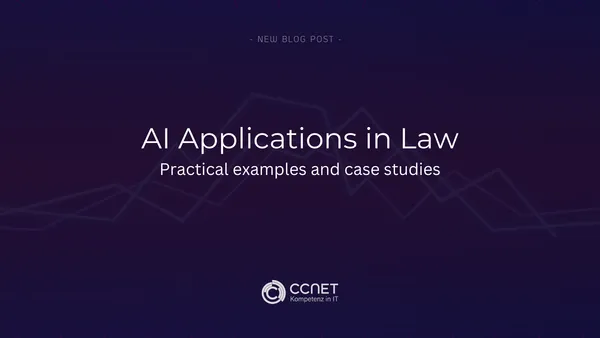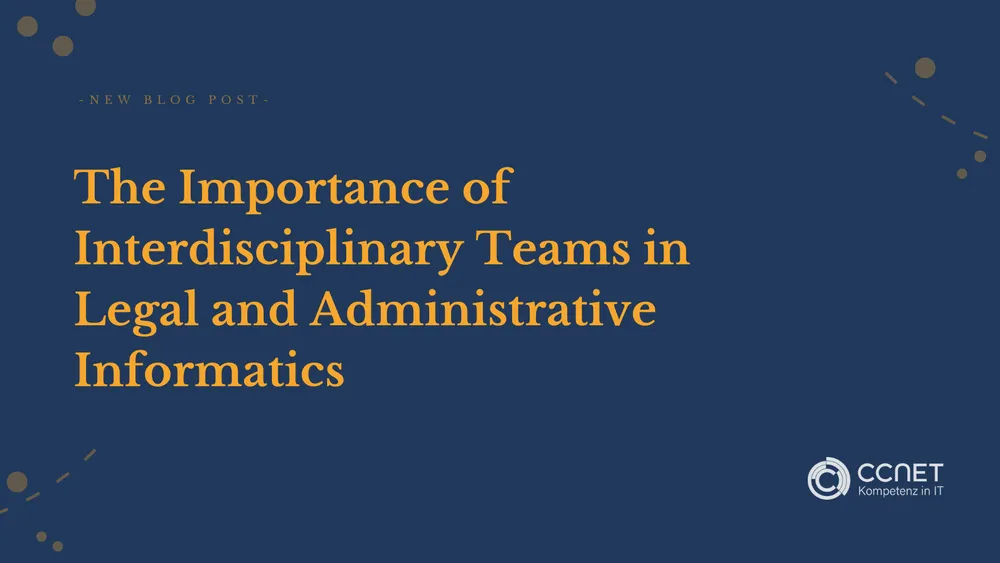
CCNet
Jul 1, 2024 • 3 min read

AI Applications in Law: Practical Examples and Case Studies
The integration of Artificial Intelligence (AI) into the legal sector has significantly increased in recent years, bringing numerous practical examples and case studies that demonstrate the diverse applications and impacts of this technology. In this blog post, we'll delve deeper into these innovative applications, analyze how they are transforming the legal domain, and look ahead to future developments.
Further information can be found here: AI-Solutions
AI in Judicial Dispute Resolution
AI systems are increasingly being used in judicial dispute resolution to improve efficiency and enhance the accuracy of legal decisions. For example, the "ROSS" system, an AI-based legal assistant, helps lawyers quickly identify relevant cases and legal precedents. These technologies facilitate the work of lawyers and help alleviate the burden on courts by streamlining case management and decision-making processes.
Automated Contract Analysis
Automated contract analysis is another significant application of AI in law. Tools like "Kira" and "LawGeex" employ machine learning algorithms to review contract documents and extract critical information such as obligations, rights, and potential risks. This not only speeds up the review process but also reduces human errors, enhancing both efficiency and accuracy in legal analyses.
Prediction of Legal Disputes
AI technologies are also employed to assess the likelihood of future legal disputes. Companies utilize these systems to proactively identify potential legal challenges and take preventive measures. This capability helps companies save substantial legal costs by allowing them to make strategic decisions and better prepare for potential legal challenges, thereby strengthening their long-term stability and competitiveness.
Fraud Detection and Compliance Monitoring
In the realms of fraud detection and compliance monitoring, AI systems like "CaseText" and "Compliance.ai" play a crucial role by harnessing advanced algorithms and natural language processing capabilities. These programs tirelessly sift through vast repositories of laws, regulations, and court rulings, extracting pertinent information to ensure that companies and organizations remain firmly within the bounds of legal compliance. In industries rife with heavy regulations, such tools are invaluable assets, acting as vigilant guardians against potential pitfalls and legal entanglements. By continuously scanning and analyzing regulatory landscapes, they empower businesses to navigate complexities with confidence, mitigating the risk of hefty fines and reputational damage stemming from non-compliance. Thus, they not only serve as proactive safeguards but also as strategic allies in the pursuit of ethical and lawful business practices.
Challenges and Ethical Considerations
Despite the advantages, the introduction of AI into the legal sector is not without challenges. Issues of accountability, transparency, and data protection are of paramount importance. Legal regulation must evolve alongside technological advancements to ensure that AI applications remain fair and ethically acceptable. This necessitates continuous review and adaptation of laws to meet changing demands and to safeguard stakeholders' interests.
Conclusion
AI technologies are revolutionizing the legal sector by improving efficiency and creating new opportunities for legal practitioners and their clients. The balance between the potential benefits and ethical considerations is critical to ensure that AI is used responsibly in the legal domain. As this field continues to evolve, it is vital to continue discussing and addressing the profound implications AI has on traditional legal practices.
Stay tuned for more insights and discussions about the evolving role of AI in the legal domain and its impact on traditional practices!
How is AI used in judicial dispute resolution?
AI systems such as "ROSS" help lawyers quickly identify relevant cases and jurisprudence by analysing large amounts of data from previous cases. This increases the efficiency and accuracy of legal decisions and reduces the workload of the courts.
What is automated contract analysis and how does it work?
AI systems such as Kira and LawGeex use machine learning to review contract documents and extract important information such as obligations and risks. This reduces the time required and minimises human error, improving efficiency in legal analysis.
How does AI help with fraud detection and compliance monitoring?
AI programmes such as "CaseText" and "Compliance.ai" evaluate laws, regulations and court rulings to ensure that companies and organisations meet legal requirements. They enable continuous monitoring and analysis of compliance data and help detect fraud at an early stage.
How can AI help companies predict legal disputes?
AI technologies assess the likelihood of future litigation by identifying potential legal challenges at an early stage. This enables companies to take preventive measures and better prepare for possible legal challenges.
What are the advantages of using AI in the legal sector?
AI technologies increase efficiency, improve accuracy in legal analysis and open up new opportunities for legal practitioners and their clients. They enable faster processing of information and more accurate prediction of legal risks.
What ethical considerations must be taken into account when using AI in the legal sector?
Ethical challenges include issues of accountability, transparency and data protection. It is important that the use of AI in the legal sector remains fair and ethically acceptable, which requires continuous review and adaptation of the legal framework.


